SCOTLAND.
The Paisley election has terminated in the return of Sir Daniel Sandford. 'I'his result is different from that which a letter, published in last week's Spectator, led us to expect. On the close of the first day's poll, the numbers were these — Sandford, 489; Crawford, 439;
Gordon, '29. Captain Gordon retired some hours before the close of the first day's poll. About seventy of Mr. Douglas's friends stood
aloof ; and as they held the election in their hands, it was of course the object of both candidates to obtain their support. III this respect, Sir Daniel appears to have been most successful ; notwithstanding Mr.
Crawfurd, in reply to a question put both to him and his opponent, pledged himself to resign his seat whenever called upon by a majority of his
constituents, and Sir Daniel Sandford would only promise to retire if' his services were disapproved of after a three years' trial. The next day (Saturday last), the polling TCC011alleaCCII, and was protracted till four o'clock, though few votes were given. At the final close, there appeared for Sandford, 54.2 ; Crawford, 509; thus giving the former a majority of 33. From the accounts in the Glasgow papers. it would seem that there was a singular mixing up of parties in this severe struggle,—some .Anti- Reformers, but adverse to the union of Church and State, voting for Mr. Crawford ; while sonic keen Radicals, but keen( liurelituen also, gave their support to Sir Daniel Sandford. The loss of Mr. Crawford's election appears to have been in a great measure owing to. the desertion of some of Mr. Douglas's friends, who were disaipointed on fouling that their candidate lied a minority only of the householders, and was consequently obliged to retire. Tories consider the return of the successful candidate as a triumph of their party and principles. Whether such is really the case, will depend of course on the future conduct of the new Aleinher in the House of Com- mons. At present there seems to be a gond dual of uncertainty as to his polities; and, judging from his speeelies during the contest just terminated, it is not unnatural to apprehend that he is something of a trimmer. It will not answer at the presetit time, however, for any man to pursue a wavering or place-hunting course in public life. Sir Daidel will find that his gift of ready and showy talking, which is de- '-en he'd ;is being of a superior (a der, will !,e of little service to him if lie should get the character of being a trading politicivi, mm ho regards. a seat in Parliament merely a: mu stepping-stone to i lamp. It is rertain'y
sale (led by many that such is his (lisigii. We hope that these sus-
picions ate ill-foundt )1 ; um? it. th■ilk Coat the ioltahirants of Paisley would have acted more ;visely in choosing IL strglitforward nian, of business talents, and uncoloinoit itiformation. Ike Mr. Crawford, in preference to a scholarlike orator, learit,d in Greek metres, lint uncertain in his politics, such as Ptores-o:. SoloAOrd, yet we are willing to give the liCW Altiiihnr the credit of geed ilitentions, and to take hint for an honest Representative, until I.y bis deeds he shows hinisell Ili be the reverse. Mr. crawfuld conies out of this contest very honourably. 'Hutt lie should have been def.att (4 is not sanitising ; it is on the contrary remerkable, that, coining into a field already occupied, at the eleventh hour, he should have obtained very nearly half the votes in the place. There are mm Ii' about 1100 tptilitied votes in Paisley: of these, no fewer than 1080 went to the poll. and ;,09 recorded their suffrages for Mr. Crawford.


















 Previous page
Previous page